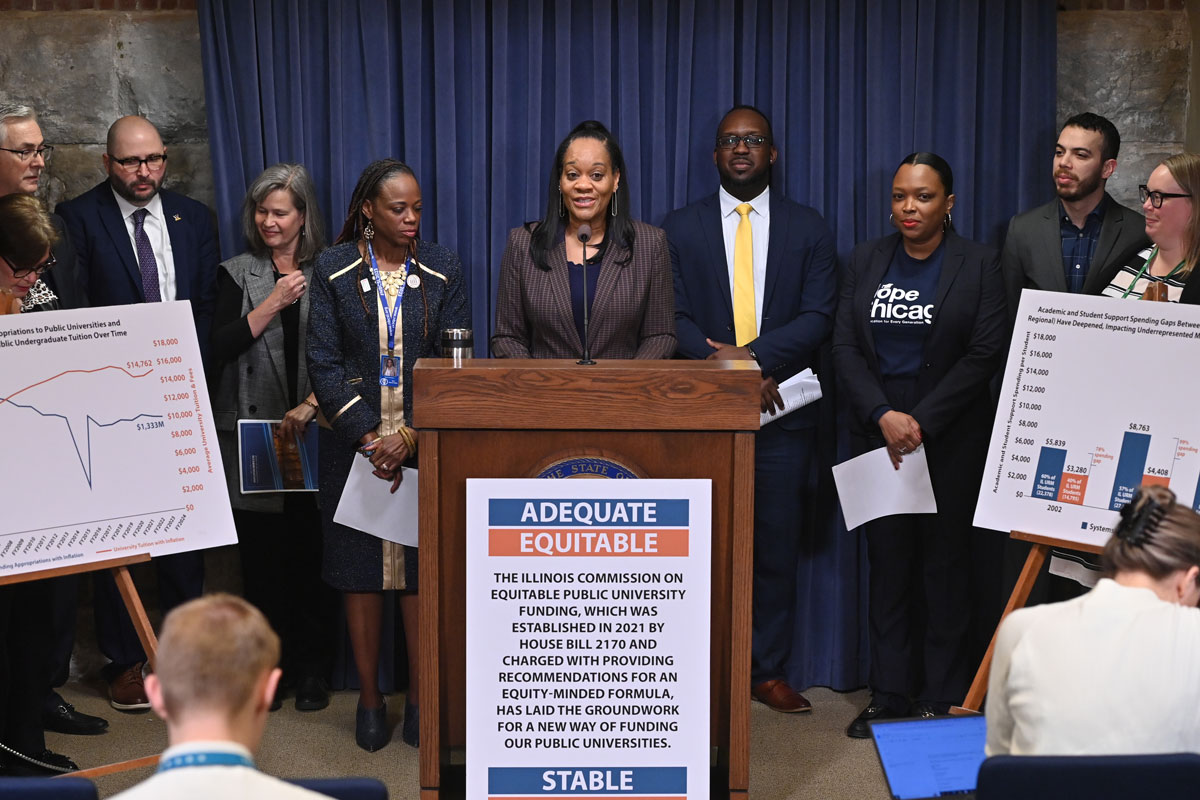 SPRINGFIELD – Standing alongside advocates, university professionals and students, Senate Majority Leader Kimberly A. Lightford outlined the data-driven findings of the Commission on Equitable Public University Funding at a press conference Wednesday.
SPRINGFIELD – Standing alongside advocates, university professionals and students, Senate Majority Leader Kimberly A. Lightford outlined the data-driven findings of the Commission on Equitable Public University Funding at a press conference Wednesday.
“Equitable funding promotes diversity and inclusion within higher education. It enables institutions to implement programs and initiatives aimed at recruiting and supporting students from underrepresented backgrounds,” said Lightford (D-Maywood). “This not only enriches the educational experience for all students but also prepares them to thrive in an increasingly diverse and globalized world. By investing in diversity, we are creating a more equitable society and fostering innovation and creativity.”
The report follows Lightford’s passage of a 2021 measure to create the Commission on Equitable Public University Funding. Over the last two years, the 30-person commission studied if public institutions of higher education are in dire need of a new funding model when serving underrepresented and historically underserved student groups, including Black and Brown students, as well as students from low-income families.
“For too long, the funding approach Illinois used did not consider student need or diversity, providing across-the-board increases or decreases without any attention to what students require to succeed and thrive in higher education, or what institutions need to accomplish their missions and serve their unique populations,” said Robin Steans of Advance Illinois. “We are overdue for a new approach and now have a road map for creating a more equitable higher education funding formula that is rooted in student need and equity.”
The commission found on average, university systems in Illinois spend over double the amount on academic and student supports – the spending that most directly impacts student success – than at its less-resourced regional universities. Worse, these arbitrary and inequitable allocation decisions have compounded yearly due to a lack of equitable distribution.
"These recommendations are bold and speak to the needs of our students and the institutions that serve them," said Christian Perry, director of policy and advocacy at Partnership for College Completion. "We are proud to support this report and educate people across Illinois to spread the word about how we can transform our higher education system and our state's future economic vitality for the better."
The commission outlined its proposed funding formula for public higher education, which would be calculated based on students’ needs, be driven to support historically underrepresented students and the universities that disproportionately enroll them, and get all universities to adequate funding within 10-15 years.
“The Commission’s recommendation that Illinois adopt a funding formula for higher ed that is both equity- and adequacy-based makes more sense now than ever for two key reasons: First, the correlations between educational attainment and economic viability have never been greater — folks with a B.A. or more now have earnings that are 85% greater than high school grads, so ensuring public universities have adequate resources to increase overall graduation rates makes sense,” said Ralph M. Martire, Center for Tax and Budget Accountability. “Second, we know that only 37% of Black students who enter college graduate, while 70.2% of their white peers do. That discrepancy is a legacy of the historical structural racism that has denied Blacks in Illinois equal access to educational opportunities for generations. This means building equity into the higher ed funding formula is a crucial step to redressing structural racism and building an Illinois where everyone has the ability to prosper, irrespective of race, income, ethnicity or other innate characteristic.”
Lightford is expected to host a subject matter hearing in the Senate Higher Education Committee in the coming weeks to further discuss the findings of the report (linked here).













 © 2026 Illinois Senate Democratic Caucus
© 2026 Illinois Senate Democratic Caucus